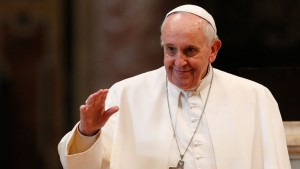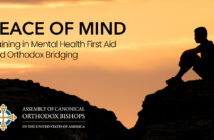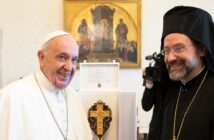Source: Our Sunday Visitor
A look at the meaning and motivation behind our frank pope
Austen Ivereigh OSV Newsweekly
Last month in Rome, a senior Catholic commentator was contacted by a U.S. news channel. Could he come into the studio to explain what Pope Francis meant when he said that couples who choose not to have children are part of a “greedy generation”? They were still absorbing his suggestion that Catholics shouldn’t breed like rabbits, which had offended people with big families; was he now going back on that? Was this a politician’s attempt to appeal to different constituencies?
“Is it just me,” the CNN host asked John Allen, “or is the pope talking out of both sides of his mouth?”
March 13 marks the two-year anniversary of Pope Francis’ election, and since then, the soundbite-loving, 24-hour news industry, turbo-charged by social media, has been fascinated by Pope Francis’ forthright, amusing and sometimes bewildering comments. Equally busy are the spokespeople and commentators offering to put them all in context and explain what he meant.
The pope’s handlers aren’t trying to stop him, even if they could. Pope Francis reserves the right to speak directly to the outside world — no pope has ever spoken so frankly and so openly to the Vatican press corps — and his unfiltered remarks are one of the reasons why he is both popular and admired. Pope Francis is news because he matters. He is a religious leader capable of attracting 7 million rain-soaked people at an open-air Mass in Manila, Philippines, of brokering the restoration of U.S.-Cuba ties after 40 years, and of directing the biggest shake-up in Church governance in generations. But he is news also because he communicates vividly through actions and off-the-cuff remarks rather than through solemn declarations.
They can appear contradictory in part because Catholic teaching doesn’t fit simply into the “categories” often applied in news stories. Pope Francis’ reaffirmation of the male priesthood might seem to contradict his call for more women to occupy positions of leadership in the Church, but only if priesthood is equated (as the media does) with power and status. In the same way, Pope Francis can appear to be saying two different things because the reports of his remarks carry only one segment of a teaching that is both broad and balanced: thus, marital sexuality must be open to the gift of life, but couples are also called to discern, responsibly, the right number of children they can raise.
And sometimes Pope Francis seems to be speaking out of both sides of his mouth because of the distinction between doctrine and pastoral ministry. When Pope Francis stands firm against the “ideological colonization” of gender theory that is seeking to redefine marriage, he is defending the integrity of doctrine. When he said, “If a person is gay and seeks God and has good will, who am I to judge?” he is articulating God’s unconditional embrace of all his creatures. Because he is both solidly rooted in the tradition of the Church and a pastor of great compassion, the tension between doctrine and application can seem particularly marked in him.
•••
A large part of the great reform Pope Francis is carrying through is about the universal Church recovering its pastoral dimension, which has grown less visible over the past two decades because of the papacy’s emphasis on teaching clear doctrine. The stress on clarity and continuity has given an impression to outsiders of stasis and rigidity, symbolized by carefully vetted documents of theological precision.
Pope Francis’ proclamation is made in a missionary key. His free style of speech communicates the dynamism of a Church led by the Holy Spirit, one capable of speaking heart to heart, and open to new possibilities. As a pastor rather than an academic, he’s less interested in consistency than in coming alongside people and speaking directly to them. Sometimes it can even seem as if Pope Francis is shockingly indifferent to how the world may interpret or misinterpret his words and actions, most spectacularly when the 90-year-old owner of an Italian newspaper wrote up two encounters with him, putting words into his mouth he never said. Pope Francis assumes that Church teaching is clear and can always be clarified if necessary, but what matters is the concrete situation and the specific person — in this case, the relationship built and the dialogue that follows. He is convinced that the Holy Spirit uses such bridges. How the world sees or interprets these is a secondary consideration.
He has a gift for startling imagery. Reflecting in May last year on a New Testament passage describing the early Christian church decision to accept Gentiles in addition to Jews, Pope Francis said that if Martians landed in the Vatican asking to be baptized, he would happily do so: “Who are we to close the door?” he asked.
He is adept at ordinary human remarks that break down barriers: “I’m a dinosaur. I don’t know how to work a computer. What a pity, huh?” he said to a special-needs girl who asked him if he downloaded pictures (it was a reasonable question; the pope was after all talking to her via Google Hangout).
Sometimes his remarks are earthly humorous, the kind of everyday language not associated with popes, as when he told journalists that as an auxiliary bishop in Buenos Aires in 1994, he wanted to kick two government officials “where the sun doesn’t shine” after they tried to involve him in corruption. Sometimes the words come straight from the heart, as in the remarkable dialogues he held in Manila with young people. When a girl asked him why children suffer, he told her that “only when we too can cry about the things you said can we come close to answering that question … Certain realities of life we only see through eyes cleansed by our tears.”
“This I ask you: be shepherds with the smell of sheep; make it real, as shepherds among your flock, fishers of men.”— Pope Francis, March 13, 2013
•••
At the end of that dialogue, Pope Francis came close to saying why it was vital for him to communicate the way he does. After apologizing for not reading his remarks, he said he was consoled by the phrase “reality is superior to ideas” — one of the four maxims that he has used throughout his life. “The reality that you have is superior to the paper I have in front of me,” he told them. He is convinced that reality is where God meets us: not in abstraction and ideology, but in the immediate and the concrete human realities of daily life; or, as he put it as a Jesuit, on the “frontier” rather than in the “laboratory.”
Spontaneity is the new norm in papal speech. Journalists covering Pope Francis have long gotten used to the pope putting aside his prepared speech and speaking off the cuff, as the Spirit moves him, sometimes in Spanish, before returning to the text. The text is good and necessary, but should not block what the Spirit, through Pope Francis, wishes to say.
Some find this hard to square with the confusion and apparent contradictions that Pope Francis generates. “It’s sometimes very difficult to listen to the pope and some of the things he says off the cuff, and this is one of them,” said Rick Santorum following Pope Francis’ remark that “to be good Catholics, we don’t have to breed like rabbits.”
The former senator and father of seven tries to make a distinction between Pope Francis’ teaching authoritatively and expressing an opinion. Francis’ “opinion,” said Santorum, “doesn’t reflect the idea that people shouldn’t be fruitful and multiply, and that people should be open to life as something that is a core value of the Faith and of the Catholic Church.”
Yet Francis never came anywhere near suggesting anything of the sort. Nor is it fair to draw a distinction between the pope teaching and opining; Pope Francis is almost always teaching. The “rabbits” remark came in the context of a lengthy and powerful defense of Blessed Pope Paul VI’s encyclical against the use of contraception in marriage, Humanae Vitae (“Of Human Life”), which he portrayed as a prophetic defense of families in poor countries against the “ideological colonization” by the North.Having reaffirmed the ban on contraception as a resistance to neo-Malthusian and eugenic assumptions that the “problem” of development is that there are too many poor people in the world, he then invoked the other part of Church teaching that calls for parents responsibly to decide — using natural birth control methods, and seeking guidance — to have the children appropriate to their circumstances. In both cases, he came down on the side of freedom, thus boldly reframing the whole issue.
Pope Francis was not simply giving an opinion; he was teaching. But rather than recite well-worn phrases from texts, he expressed the doctrine vividly and accessibly, as good teachers do. What many do not seem to realize, notes Paddy Agnew, veteran Vatican-watcher and Rome correspondent of the Irish Times, is that Pope Francis “is, in fact, teaching a basically very traditional, old-fashioned Catholicism.”
If it sometimes doesn’t seem that way, it is because of the way the news media frame stories. Having decided that Pope Francis is the unconventional outsider bent on reform and change — a narrative that captures a truth about the pope — many news reports latch onto remarks that appear to suggest he is modernizing doctrine; the headlines, in turn, fuel some conservative fears that this is exactly what Pope Francis is attempting to do.
“They’ve seen how a surrender to the prevailing culture has caused an implosion of most mainline Protestant churches, and they fear the same happening to the Catholic Church,” writes Elizabeth Scalia at Patheos. “Even though nothing this pope has said or done suggests that he is about to change one dot of doctrine, they imagine the worst.”
These fears are based not just on a misreading of Francis as pope, but of the man he was before. Jorge Mario Bergoglio was deeply marked by the Second Vatican Council, which ended when he was 30, and by the Latin-American reading of the Council at the famous meeting of the continent’s bishops at Medellín, Colombia, in 1968. Yet his understanding of both was close to that of his lodestar, Pope Paul VI, who resisted attempts to use the council as an excuse to jettison core Church traditions and doctrines. Likewise, Father Bergoglio was deeply critical of some of his fellow Jesuits’ attempts to do the same. Many were surprised when, in November 2013, Pope Francis made clear to an Italian archbishop that he supported the “hermeneutic of continuity” understanding of Vatican II associated with Pope Emeritus Benedict XVI. Yet this understanding runs through his writings and actions at the time. Pope Francis is not seeking to modernize doctrine to accommodate it to the world — one of the “temptations” he warned the synod to avoid last October — but modernizing the Church to better equip it to evangelize the world.
His freewheeling style — or, as he would put it, “being normal” — is core to that mission. He knows that, in a word-glutted world, actions speak loudest (or, as St. Ignatius of Loyola put it, “love is known more in deeds than in words”); and that directness and spontaneity are marks of authenticity. He knows how to use humor to lighten the mood around difficult questions, which can be made gloomier by abstract language; and he knows the power of iconoclasm when used, as Jesus did, to defy rules that put institutions before human flourishing. When he washed the feet of two Muslim prisoners during his first Easter as pope, or invited women whose babies he baptized in the Sistine Chapel not to worry about breast-feeding them there, he caused scandal in the biblical sense of placing a skandalon, a stumbling-block, in order to expose priorities.
•••
One of the most important iconoclastic acts as pope has been in respect to the papacy itself, where the scandals he has provoked continually force the question to be asked: What is the papacy for? Is it to act as a symbol of static, unchanging uncontinuity by solemnly repeating well-established doctrine in ever clearer terms? Or is it to evangelize, to promote the mission of the Church in the world, taking Church teaching out to the far corners of the earth, to unblock the channels to allow the Holy Spirit to flow more freely? For many of those reassured by the first model, Pope Francis has been deeply unsettling — especially in his communication style. The veteran blogger Father Dwight Longenecker critiques the pope for creating “confusion, consternation and bewilderment among the faithful,” and for eroding the papacy’s teaching authority by what he calls “an informal and often ambiguous method of communication.”
Yet Father Longenecker, like many conservatives, confuses authority with dignity when he advises that “a pope, like a monarch, should realize that when it comes to public utterances, less is more.” Pope Francis is occupying the shoes of a fisherman, not the throne of a king; the papacy is not a monarchy just as the Church is not a democracy. And far from eroding the teaching authority of the pope, Francis has placed it at the center again of the world stage.
“Love surprises because it opens a dialogue of loving and being loved. God is a God of surprises because he loved us first. God awaits us to surprise us … God reveals himself through surprises.”— Pope Francis, Jan. 18 in Manila, Philippines
The most serious misreading was sparked by Pope Francis’ remark, in the wake of the Charlie Hebdo massacre in Paris, that those who make fun of what is sacred to others can expect a reaction, a point he illustrated by pretending to punch a Vatican official who he imagined had insulted his mother.
Taken in the context of his other remarks, the comment was obviously intended, as the Vatican spokesman, Father Federico Lombardi, pointed out later, as an invitation to think about the consequences of the misuse of free speech in a pluralistic society. Yet the idea that the pope was justifying violence in response to the exercise of a legal right to free expression was too much for the media to resist. As the news cycle began to accelerate, the British prime minister felt obliged to disagree with what the pope was assumed to have meant, leading to the bizarre headline, “Pope Francis is wrong to endorse revenge in wake of Paris attacks, says David Cameron” and a weekend of solemn lectures by liberal commentators abhorring violence.
“The pope’s free style of speech, especially in situations like the press conference, must be taken at face value and not distorted or manipulated,” the Vatican admonished, aware that his statement had been willfully misconstrued for the sake of a story. But by then it had taken wing.
•••
Do such misinterpretations mean that Pope Francis should say less and speak more carefully, sticking to the script? Those who believe so point out that once headlines take off, a narrative gets established that subsequent clarifications can barely dislodge. And given that most Catholics get their news about the pope from the same news media as everyone else, it’s hard for them to correct the spin. Many Catholics are left dismayed and confused.
In fairness, this is not new. Pope Benedict’s comments and remarks — usually made not in off-the-cuff exchanges but in scripted and vetted written papers — frequently generated bizarre or misleading stories. It is part of the culture of contemporary public life, dominated by a news media that hones in relentlessly on the words themselves rather than their intended meaning. In most human interaction, there is a mutual effort at comprehension and a right to retract and clarify, but in public discourse, every statement can be scrutinized and misinterpreted, and as long as the words are accurately reported, any malicious interpretation is fair game. The result is ruthless message discipline, where remarks are carefully vetted beforehand to prevent any misconstruction, and a language that is bone-dry, banal, vague and evasive — the currency of today’s public discourse.
For Pope Francis to go the same way would be a disaster. The media love the pope because he is exactly who he is: a person of passion and conviction with strong views he is unafraid to express boldly. In a world of gray, calculated language, he paints in vivid colors, and is all the more compelling because of his total disregard for political correctness. Only Pope Francis could have referred to Europe as a “grandmother, no longer fertile and vibrant” when addressing the European Parliament in Strasbourg, France, or to have listed the ills besetting Vatican bureaucracy using metaphors of contemporary illnesses such as Alzheimer’s and Schizophrenia. The offense he causes with such remarks (“the love-in with Pope Francis is over, at least as far this Catholic feminist is concerned,” sniffed Joanna Moorhead in the British daily newspaper, The Guardian, after the Strasbourg remark) is proof that the pope is the very opposite of a politician currying favor. For the pope, it is more important to speak the truth than to avoid offense. In this, as in so much else, Jesus — who was deeply offensive — is his model.
Pope Francis, who is not garrulous by nature — as Jesuit provincial, he was known as La Gioconda, because he was famously inscrutable, and as archbishop of Buenos Aires, he was famous for being taciturn and aloof — has become the most talkative of modern popes for a reason: He has discerned what the successor of St. Peter is called to do. The pressures to say less — media manipulation, the dignity of the office, the fear of being misinterpreted, the risk of confusing Catholics — come from anxiety. He sees them as temptations of the bad spirit. The greatest risk to the Church, he believes, is its conformity to the world, its most insidious temptation what he calls “spiritual worldliness.” To be worldly is to accept the role contemporary Western secularism has assigned the Church — as a private institution that should stay silent.
To counter this, he believes that what is needed, above all, is parrhesia, a Greek word that can be variously translated as apostolic courage, prophetic directness or bold proclamation. Parrhesia is what he called for in his famous brief remarks to the cardinals in March 2013 that persuaded many to elect him; it is what he asked of the synod fathers when they gathered in October, and what he urges on his cardinals when they gather in Rome for the extraordinary consistories. Parrhesia stems from the pope’s conviction that the Holy Spirit is in charge of the Church, and that his task is to allow it to course more freely by opening up new spaces — above all in spheres that are traditionally allergic to the Church. Parrhesia is why Pope Francis doesn’t stop talking — and why he will continue to give offense and be misinterpreted: Because the Holy Spirit demands nothing less.
Austen Ivereigh is author of “The Great Reformer: Francis and the Making of a Radical Pope,” (Henry Holt, $30).
Originally published March 2, 2015
[subscribe2]



